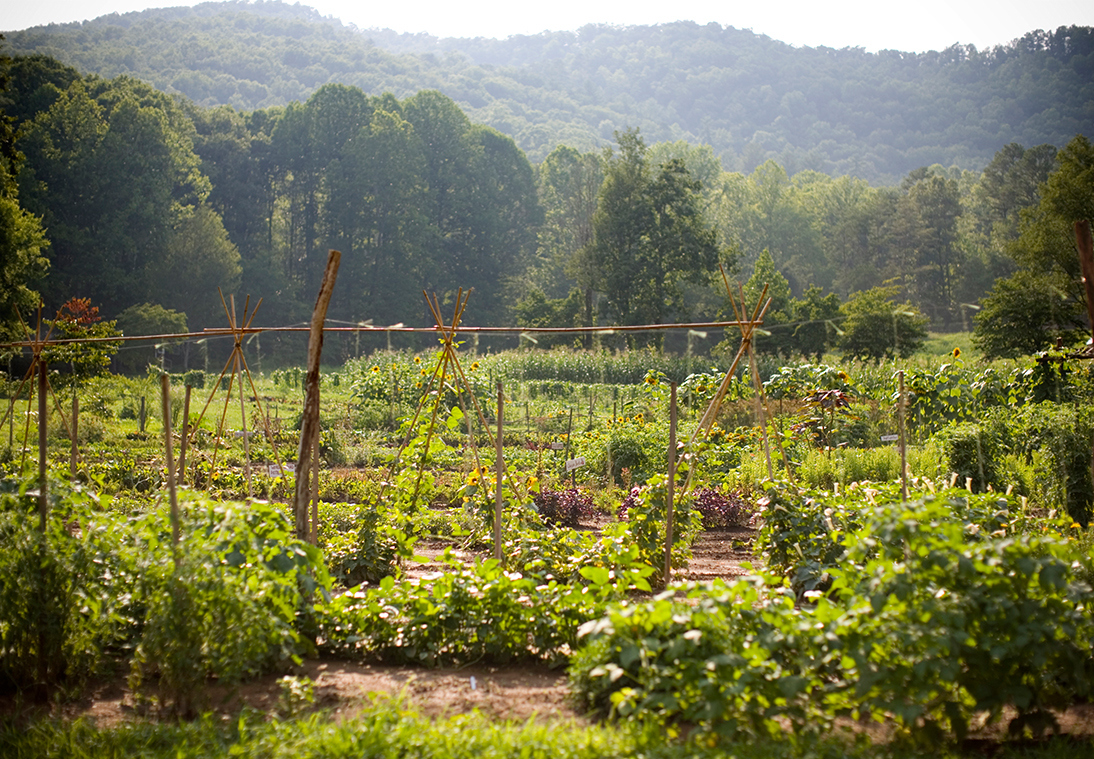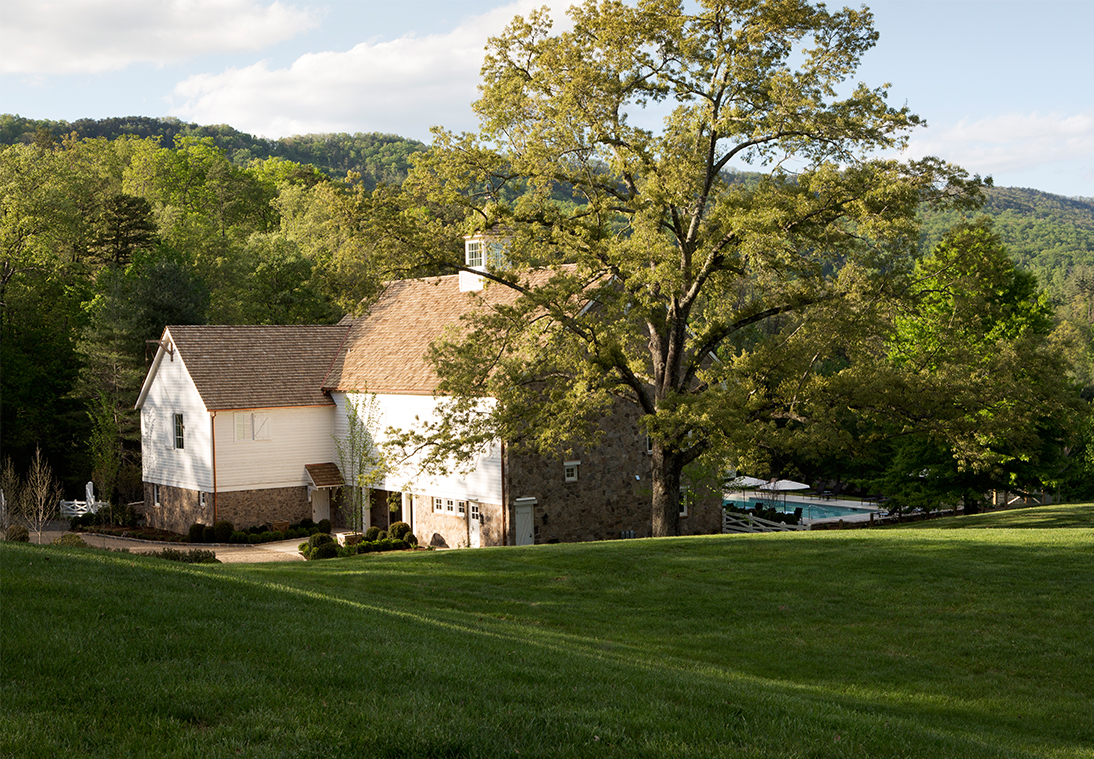33 Journal: Blackberry Farm
Tucked neatly into the low folds of Tennessee's Smoky Mountains, Blackberry Farm is achingly beautiful, impeccably run, luxuriously quiet and appealingly remote. In the early spring, we paid a visit to Jim Sanford, the resident animal whisperer and caretaker of a menagerie of animals who live what one can only imagine are idyllic lives on the acres of pristine fields that stretch out around the property, creating a safe buffer between nearby Dollywood and this souther Valhalla. Driving onto the property, we caught glimpses of fluffy sheep wandering in cloud-like herds, stout cows grazing contentedly, and horses trotting along carrying serene-looking passengers. 
 Jim, a tall, talkative former elephant trainer, met us outside the low stone reception house After a brief search for a lost cell phone ("It'll turn up," he shrugs.) he ferried us off to see his latest most unusual feat of animal domestication. Jim has spent the past nine years breeding and training a small passel of dogs to hunt truffles, a rare subterranean fungus considered, in the words of French gastronome Brillat de Savarin, "the diamond of the kitchen." Almost exclusively found in Italy and France, we were eager to understand not just how Jim imparts these pups with such a valuable skill but also why he's doing such a thing in this rural corner of Tennessee. In 2007, the late proprietor of the farm, Sam Beall, received a call from a man who claimed to have successfully grown a batch of valuable French truffles known as Perigords on his nearby farm. Jim describes Beall's (and his own) skepticism thusly: "It would be like some guy calling you out of nowhere and telling you eh's been making Rolex watches in his garage." Not only are you not likely to believe him but when he tells you he'd like to come out of the woods to show you, you might also double check the lock on your door.
Jim, a tall, talkative former elephant trainer, met us outside the low stone reception house After a brief search for a lost cell phone ("It'll turn up," he shrugs.) he ferried us off to see his latest most unusual feat of animal domestication. Jim has spent the past nine years breeding and training a small passel of dogs to hunt truffles, a rare subterranean fungus considered, in the words of French gastronome Brillat de Savarin, "the diamond of the kitchen." Almost exclusively found in Italy and France, we were eager to understand not just how Jim imparts these pups with such a valuable skill but also why he's doing such a thing in this rural corner of Tennessee. In 2007, the late proprietor of the farm, Sam Beall, received a call from a man who claimed to have successfully grown a batch of valuable French truffles known as Perigords on his nearby farm. Jim describes Beall's (and his own) skepticism thusly: "It would be like some guy calling you out of nowhere and telling you eh's been making Rolex watches in his garage." Not only are you not likely to believe him but when he tells you he'd like to come out of the woods to show you, you might also double check the lock on your door.  As it turns out, the caller was no shaggy mountain man but a middle-aged scientist named Tom Michaels, a man with a PhD in horticulture who specialized in truffles and had indeed successfully grown Perigords in the roots of his hazelnut trees. From there, Beall and Sanford, at the behest of Dr. Michaels, went to Italy to bring back a Lagotto Romognolo, a keen-nosed breed with a long history of truffle hunting. That first dog, a serious-browed, bilingual and methodical fellow named Tom, uncovered 200 pounds of Perigord truffles (that sell for a staggering $1000 a pound) in his first season digging on Dr. Michael's property. A blight on the trees decimated succeeding harvests, but Jim and Dr. Michaels are actively working to revive their truffle output. With fewer truffles to hunt, Tom begat a biblical lineage of Lagotto Romognolos. Jim oversees the breeding and births of three litters a year. He keeps the number of puppies well below demand to ensure that he can provide hands on training to each dog. This includes a stint in Jim's own home for every puppy to work on house training. Each puppy usually only spends six to eight weeks on the farm before being hand-delivered by Jim to his or her new family. Two litters had been born within the six weeks prior to our visit--somewhere around sixteen new puppies to care for and teach. With the arrival of these new trainees, his time is now split between coaxing truffles back into his soil and breeding, training, caring for and delivering these beautiful dogs to lucky and, with a three year waiting list, patient Blackberry Farm guests. In a place renowned for its legendary mix of luxury, food, and unexpected charm, well-trained Italian dogs hunting a rare French delicacy in the wilds of Tennessee may be the perfect encapsulation of Blackberry Farm's inimitable allure.
As it turns out, the caller was no shaggy mountain man but a middle-aged scientist named Tom Michaels, a man with a PhD in horticulture who specialized in truffles and had indeed successfully grown Perigords in the roots of his hazelnut trees. From there, Beall and Sanford, at the behest of Dr. Michaels, went to Italy to bring back a Lagotto Romognolo, a keen-nosed breed with a long history of truffle hunting. That first dog, a serious-browed, bilingual and methodical fellow named Tom, uncovered 200 pounds of Perigord truffles (that sell for a staggering $1000 a pound) in his first season digging on Dr. Michael's property. A blight on the trees decimated succeeding harvests, but Jim and Dr. Michaels are actively working to revive their truffle output. With fewer truffles to hunt, Tom begat a biblical lineage of Lagotto Romognolos. Jim oversees the breeding and births of three litters a year. He keeps the number of puppies well below demand to ensure that he can provide hands on training to each dog. This includes a stint in Jim's own home for every puppy to work on house training. Each puppy usually only spends six to eight weeks on the farm before being hand-delivered by Jim to his or her new family. Two litters had been born within the six weeks prior to our visit--somewhere around sixteen new puppies to care for and teach. With the arrival of these new trainees, his time is now split between coaxing truffles back into his soil and breeding, training, caring for and delivering these beautiful dogs to lucky and, with a three year waiting list, patient Blackberry Farm guests. In a place renowned for its legendary mix of luxury, food, and unexpected charm, well-trained Italian dogs hunting a rare French delicacy in the wilds of Tennessee may be the perfect encapsulation of Blackberry Farm's inimitable allure. 


